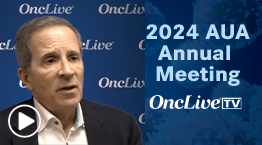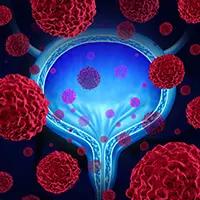FIDES-02 Data Fail to Support the Development of Derazantinib in Metastatic Urothelial Cancer
Andrea Necchi, MD, discusses the efficacy and safety data reported from the FIDES-02 study, explains the clinical relevance of these data despite the trial’s negative result, and highlights several other influential studies presented at the 2023 Genitourinary Cancers Symposium.
Andrea Necchi, MD

Although derazantinib monotherapy did not meet the prespecified benchmark for efficacy needed to support its continued clinical development in metastatic urothelial cancer, its prior investigation in this space indicates the importance of biomarker-driven strategies in identifying patients who may benefit from FGFR targeted therapies, according to Andrea Necchi, MD.
The FGFR1-3 kinase inhibitor previously demonstrated strong antitumor activity and a manageable toxicity profile in the phase 2 FIDES-01 study (NCT03230318) in patients with locally advanced or metastatic intrahepatic cholangiocarcinoma expressing FGFR2 alterations, receiving orphan drug designation from the FDA in this disease setting.1
The agent was also evaluated in the multicohort phase 1b/2 FIDES-02 study (NCT04045613) as a single-agent and in combination with atezolizumab (Tecentriq) for patients with metastatic urothelial cancer harboring FGFR1-3 genetic alterations. Data from substudies 1 and 5 (n = 49) were reported at the 2023 Genitourinary Cancers Symposium, demonstrating that derazantinib monotherapy did not meet its primary efficacy end point in either cohort, with a combined overall response rate (ORR) of 8% (95% CI, 3%-20%). Median progression-free survival (PFS) and overall survival (OS) were 2.1 (95% CI, 2.00-2.10) and 6.6 (95% CI, 4.44-8.15) months, respectively.
All patients had discontinued treatment at the time of data cut-off. However, derazantinib did show a manageable safety profile, with low rates of treatment-related retinal events (16.0%), nail toxicities (4.0%), and stomatitis (4.0%).2
“Now the question is how to best interpret differences in the response rates and activity between FGFR1-3 inhibitors and [determine] the role of biomarkers when selecting patients for targeted therapy,” Necchi said in an interview with OncLive®.
Necchi, who is the director of Genitourinary Medical Oncology at IRCCS San Raffaele Hospital and Scientific Institute, and an associate professor at Vita-Salute San Raffaele University in Milan, Italy, discussed the efficacy and safety data reported from the FIDES-02 study, explained the clinical relevance of these data despite the trial’s negative result, and highlighted several other influential studies presented at the 2023 Genitourinary Cancers Symposium.
OncLive: Could you provide an overview of the design and methodology for the FIDES-02 trial in patients with metastatic urothelial cancer expressing FGFR1-3 genetic alterations?
Necchi: FIDES-02 was a phase 1b/2 multicohort platform study investigating derazantinib, an orally available multi-kinase inhibitor with a distinct anti-FGFR1-3 effect, in patients with metastatic urothelial carcinoma in various disease settings. The platform study provided derazantinib monotherapy at different doses in the second or later lines for patients who had already experienced chemotherapy with or without further immunotherapy, or as a frontline monotherapy in patients [who were] ineligible to receive cisplatin chemotherapy. [Derazantinib was also given] in combination with atezolizumab in these same populations. The study was closed in advance due to inactivity.
Please discuss the efficacy and safety findings presented at this year’s meeting.
We focused the presentation [on data from] substudies 1 and 5 [regarding] the role of derazantinib monotherapy [at] 2 different dose levels as a second- or third-line therapy in patients with metastatic urothelial carcinoma who had already been treated with chemotherapy. ORR, which was the primary end point of these cohorts, was 8%. It did not meet the minimum requirement to allow us to move forward with [derazantinib] monotherapy in this patient population. Overall, the drug was safe, and the rate of toxicities like hyperphosphatemia were very low compared with similar compounds.
Despite the study’s negative result, how do these findings help inform the use of FGFR targeted agents in metastatic urothelial cancer? What questions still need to be addressed to clarify the study outcome?
Next steps are outside of the aim of this study because the FIDES-02 study was closed. It is unlikely that there [will be] any further development [of] derazantinib monotherapy, at least in urothelial carcinoma.
The [question] raised by the FIDES-02 study, relative to the development of the FGFR1-3 inhibitors in patients with FGFR1-3-altered urothelial carcinoma, is how to best select patients for [targeted therapies] according to gene mutations or fusions. [We also should understand] which genes to select out of FGFR1, FGFR2, or FGFR3. For example, erdafitinib [Balversa] therapy [is] selected [for] patients with specific FGFR2/3 genomic alterations. In the derazantinib study, we were selecting patients with FGFR1-3 alterations. This may explain why we have seen inferior activity with the drug.
The other [question] is what kind of assay [we should] use to select the most suited patient for this targeted approach. [Should we use one that] selects [for] these special mutations, or a more comprehensive molecular profiling test, like the Foundation Medicine assay or similar assays? These may further [inform] the way we’re interpreting these studies. Of course, there may be a difference in activity, which is inherent to the drug’s mechanism of action. That may partly explain why certain drugs [in this category] are active and others are not.
As of today, the only [FGFR inhibitor with high activity is] erdafitinib, which [is] set apart in this disease. The ORR provided by erdafitinib was quite high compared with the response rate provided by the rest of the FGFR inhibitors. [These include] pemigatinib [Pemazyre] infigratinib [Truseltiq], and now derazantinib, which sits far below the 20% [cut-off] point of ORR.
At this year’s meeting, you were also involved in a presentation on the utility of Vesical Imaging–Reporting and Data System (VIRADS) scoring in predicting pathological responses in muscle-invasive bladder cancer (MIBC). Please highlight the results from this analysis.
I [was] particularly excited about the results presented [by my colleague] Giorgio Brembilla, MD, PhD, of Ospedale San Raffaele, Milan, Italy. He was granted an award based on this presentation. He presented results [from] a VIRADS assessment [of] patients [with] MIBC included in the [phase 2] PURE-01 study [NCT02736266]. The study was [investigating] neoadjuvant pembrolizumab [Keytruda] before radical cystectomy. [Researchers] focused on the role of VIRADS pre- and post- immunotherapy in predicting pathological response seen at radical cystectomy.
The results [demonstrated] the ability of [VIRADs], particularly in the post immunotherapy cohort, [to] predict the response to radical cystectomy. In my view, these [findings] are compelling. They may provide further suggestions on how to best use non-invasive tools to stage and evaluate the response to neoadjuvant therapies in MIBC, with the aim of avoiding radical cystectomy in select patients who respond quite well to treatment.
Were there any other presentations at the meeting that you found intriguing?
In my view, the most compelling data were the long-term follow-up data from [the phase 3] IMvigor130 [study (NCT02807636)] presented in the oral session. No positive signals for OS [were observed], and more mature follow-up confirmed that [combining] chemoimmunotherapy in the frontline [setting] of metastatic urothelial cancer is still a difficult way of developing [effective treatment strategies], at least with the backbone of cisplatin and gemcitabine.
Other important data presented [at the meeting include] more mature data on adjuvant nivolumab [Opdivo] in bladder cancer, and on sacituzumab govitecan-hziy [Trodelvy] in metastatic urothelial carcinoma in the second and third line. [The study on sacituzumab govitecan] confirmed [that] the response rate [was] approximately 30% in an unselected patient population. When comparing the activity and mature data with enfortumab vedotin-ejfv [(Padcev) vs] sacituzumab govitecan and other ADCs, there is still a bit of confusion in the interpretation [of these data]. This sets the scene for future [research on] how to [best navigate] the ADC landscape in this special population.
Disclosures: Dr Necchi reports serving as a consultant or in an advisory role for AstraZeneca, Basilea Pharmaceutical, Bayer, Bristol Myers Squibb, Catalym, Clovis Oncology, GlaxoSmithKline, Incyte, Janssen, Merck Sharp & Dohme, Rainier Therapeutics, Roche, Seattle Genetics/Astellas; he reports receiving research funding from AstraZeneca (Inst), Gilead Sciences, Ipsen, Merck Sharp & Dohme (Inst); he obtained honoraria from Astellas Pharma, AstraZeneca, Bristol Myers Squibb, Foundation Medicine, Janssen, Merck, Roche; he is currently employed by and has ownership interest in Bayer.
References
- Basilea reports updated interim results for iCCA patients with FGFR2 mutations and amplifications from phase 2 study FIDES-01 at ASCO GI Cancers Symposium. News release. Basilea Pharmaceutica Ltd. January 24, 2022. Accessed April 7, 2023. https://www.basilea.com/news/news
- Necchi A, Todenhöfer T, Deville JL, et al. Efficacy and safety of derazantinib (DZB) in patients with metastatic urothelial carcinoma (mUC) with activating FGFR1/2/3 genetic aberrations (GA): results from the phase 1b/2 FIDES-02 study. J Clin Oncol. 2023; 41(suppl 6):501. doi:10.1200/JCO.2023.41.6_suppl.501



